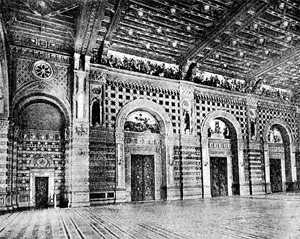Odessa Philharmonic Theater

Odessa's Philharmonic Theatre (Ukrainian: Одеська державна філармонія, Russian: Одесская филармония) is a theater in Odessa, Ukraine. The design resembles the Doge's Palace in Venice.[1]
History
The foundation stone for the theater was laid September 3, 1894, a day after Odessa's one-hundred-year birthday. The building was intended as the new stock exchange, or "New Exchange" to replace the old stock exchange, and the vast hall was decorated with six panels by the artist Nikolai Nikolaevich Karazin (1842-1908) which depict commerce throughout various stages of history.[2][3]
Like the Odessa Opera Theater before it, a world competition was announced for a conceptual design of a new Odessa stock exchange. The design of Viennese architect V.J. Prohaska was considered the best. But this design did not meet all of the requirements, therefore it was modified and improved by Alexander Osipovich Bernardacci.
Construction was completed in 1898. Since 1924 the building has housed the Odessa Philharmonic.
Construction
The theater can seat 1,000 people and is 15 meters high and 910 square meters. The large hall has no supporting columns, and because of this, it was one of the most expensive buildings in Odessa to build.[4][5]
The main entrance is by a large open-sided, roofed gallery, called a loggia. The ceiling of this open entry is painted with the twelve symbols of the Zodiac.[4][5]
The interior is paneled with dark Lebanese cedar, and the windows are set in white Carrara marble.[6]
Pictures
-
Здание Новой купеческой биржи в 1900 году
-
Вид внутреннего убранства одного из залов Новой купеческой биржи. Открытка начала XX века
-

Вид внутреннего убранства главного зала Новой купеческой биржи. Открытка начала XX века
Hobart Earle
Since 1991, American Hobart Earle has conducted the philharmonic orchestra.[7][8]
Interesting Mythology
It is an enduring myth that everyone in the city knows (and continues to promulgate) that since the building was originally designed as a Stock exchange rather than a concert hall it was made to be sound-resistant, rather than sound-conducting, in order to provide more privacy to visitors. This supposedly explains why the acoustics are rather poor, as compared with other theaters and concert halls, and performers must use microphones and amplifiers to be heard adequately. The precise and technical reasons for the acoustic problems at the hall were reported by world famous acoustics consultant Russell Johnson, the specifics of which can be found on the Philharmonic's website (http://www.odessaphilharmonic.org/pages.php?page=conc)
Quotes
| “ | ...a handsome building of oriental architecture [it] is a center of activity. The trading takes place in a splendid hall on lines similar to those of the board of trade at Chicago.[9] | ” |
Notes
- ↑ Kononova, G. (1984). Odessa: A Guide. Moscow: Raduga Publishers. p. 107
- ↑ Kononova p. 106-107
- ↑ Herlihy, Patricia (1991) [1987]. Odessa: A History, 1794-1914. Cambridge, MA: Harvard University Press. ISBN 0-916458-15-6. p. 267
- ↑ 4.0 4.1 Kononova, p.107, 108
- ↑ 5.0 5.1 Herlihy, p. 267, states the main hall is 60 meters by 120 meters
- ↑ Herlihy, p. 267
- ↑ "Hobart Earle". odessaphilharmonic.org. Retrieved 2006-07-30.
- ↑ Kening, Dan (November 21, 2004). "Surprising Odessa--and those 192 steps". Chicago Tribune: 1.
*Liss, Dana (July 19, 2002). "Odessa Philharmonic, Earle Go "National"". Kyiv Post.
*Anstead, Alicia (March 27, 1998). "Odessa Philharmonic Orchestra American conductor tirelessly works to resurrect talented Ukrainian musical organization". Bangor Daily News.
*Huisking, Charlie (March 6, 1998). "An American in Ukraine". Sarasota Herald-Tribune: 3. - ↑ Herlihy, p. 267, quoting Curtain, William Eleroy (1911). Around the Black Sea: Asia Minor, Armenia, Caucasus, Circassia, Daghestan, the Crimea, Roumania. New York: Hodder & Stoughton. p. 329.
External links
- "Odessa Philharmonic Orchestra". odessaphilharmonic.org. Retrieved 2006-08-09.
- "Odessa Philharmonic Theater". Retrieved 2006-08-09. 20 photos of the theater
| ||||||||||||||||||||||||||
Coordinates: 46°28′49.98″N 30°44′35.09″E / 46.4805500°N 30.7430806°E

